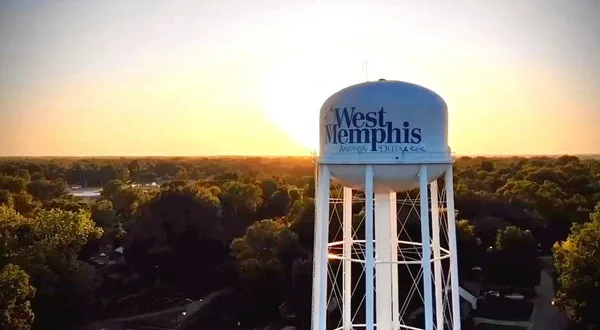
A Crittenden County judge ordered local election officials to conduct early voting at one of three contested West Memphis locations, according to an order filed Monday.
“We’re thrilled,” said Attorney Jennifer Standerfer, who represented two east Arkansas voters who sued over the lack of an early voting site in Crittenden County’s most populous city. “…We wanted one early voting location in West Memphis – the election commission wasn’t going to give us any.”
Circuit Court Judge Chris Thyer’s order, filed Monday morning, nevertheless cited confusion caused by different statutes covering day-of polling sites and early voting sites.
In a court hearing last week, Frank Barton, the chair of the Crittenden County Board of Election Commissioners, testified that he did not intend to hold early voting in West Memphis.
Standerfer filed the suit against Barton and election commissioners Anita Bell and James Pulliaum on Sept. 19. On behalf of West Memphis voters Shirley Brown and Lavonda Taylor, Standerfer argued local election officials were abusing their power by refusing to prepare early voting sites, despite having designated locations.
Thyer’s ruling sided with both parties. Repeating similar pleas from a hearing last week, he also asked both sides to appeal his ruling to the Arkansas Supreme Court for clarity on statutory construction.
“This court certainly appreciates the deep water it has been thrown into and only hopes one or both of these parties appeal this decision so that this court and future litigants may know what this enigmatic statute about early voting polling sites means,” Thyer wrote.
Standerfer said Monday she had no intention of filing an appeal. Attorney Joe Rogers, who represented the county election commissioners, was not immediately available on Monday.
Thyer’s 26-page order details his decision to require early voting at the Seventh Street Church of Christ in West Memphis, but not at a local library that commissioners couldn’t agree on or the First Baptist Church, which previously served as an early voting polling site in 2022.
“Clearly, the election commission needed some help and guidance from the court,” Standerfer said. “Our purpose in this was twofold: One was to preserve early voting access to West Memphis citizens, and the second was to make sure that there was transparency and oversight.”
At recent meetings, election commissioners considered a West Memphis library as an early voting location but failed to come to a unanimous decision about its designation, which is required by state law.
Democratic member Pulliaum voted against it twice, and though chair Barton was later told Pulliaum would vote in favor of the library if he called another meeting, Barton said he had no intention of doing so.
“It is not this court’s prerogative to order the commission to continue to hold multiple meetings until they can agree upon some suitable place,” Thyer said in his order.
Thyer also said he found the plaintiffs’ argument to conduct early voting at the library while it also considered the site an unsuitable location “makes very little sense.”
“To this court, this seems to be a particularly self-defeating example of circular logic,” he said in his order.
Regarding the First Baptist Church in West Memphis, which served as an early voting site in 2022, Thyer found that election commissioners were not required to prepare it as such for this year’s general election.
Previous testimony from Barton questioned whether a state statute about designating a “polling site” included early voting locations. Barton said he believed day-of sites and early voting locations had different establishment requirements because they were in separate statutes.
While one statute says day-of sites would revert back to locations designated in previous years, the same process wasn’t outlined for early voting, Barton previously testified.
Plaintiffs argued that the relevant statute does not have language that limits polling sites to day-of locations.
Thyer said he found both to be reasonable interpretations of the law; however, “the best (or safest) reading of these statutes is to read them separately and to read them as dealing with distinct subject matters, objects and purposes.”
Thyer found the final contested West Memphis polling site, the Seventh Street Church of Christ, to be appropriately designated by County Clerk Paula Brown in a letter to the election commissioners.
Defendants argued that Brown could only conduct early voting in the courthouse. The Crittenden County Courthouse is currently, according to Thyer’s order, “in a bad state of disrepair.”
The building is not easily accessible for those who are handicapped or have mobility issues, Thyer said. A ramp to the basement, which has a small elevator that would take residents to the location of early voting, is only usable when it is not raining because it floods.
“Defendants claim that is not a significant problem based on the presumption that it will not rain every day of early voting,” Thyer said in his ruling. “Essentially, counsel would have this court believe that the Arkansas Legislature and all defendants care so little about the elderly, infirm or handicapped citizens in Crittenden County that their only opportunity to early vote is when it does not rain.”
“The court’s guess is that most, if not all, the actual elected officials in Crittenden County do not share counsel’s view.”
Though Barton previously testified that he believed the clerk did not have the authority to designate an early voting site outside of the county courthouse in the seat of Marion, Thyer found Brown acted appropriately.
Early voting starts Oct. 21. In addition to the Seventh Street Church of Christ, early voting will be available in Marion.
To view this story, or more news updates from Arkansas Advocate, click here.
WebReadyTM Powered by WireReady® NSI










